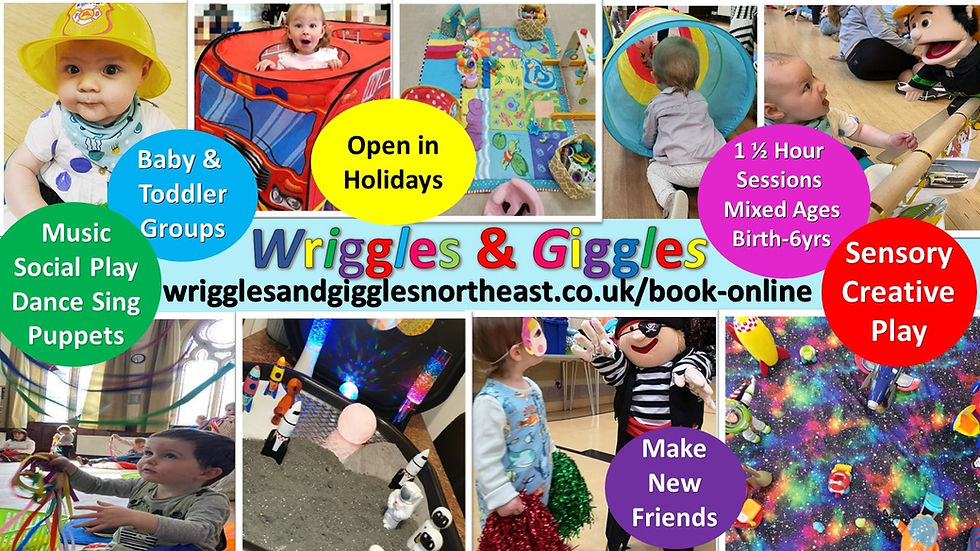Solo Play Benefits
- Wriggles & Giggles
- Apr 24, 2022
- 4 min read
Updated: Jul 5, 2024
While interaction with adults and peers is vital to a child's development, experts say it's just as crucial for babies and toddlers to have time by themselves. Solo time provides a baby with a variety of learning opportunities -- he can explore his environment at his own pace, become self-reliant, focus his attention, and learn from his mistakes. An added bonus: All of these experiences boost a child's self-esteem.
Since a child may see himself as a separate individual for the first time at around 8 months, independent play also helps to strengthen his identity. He'll become a friend to himself and feel comfortable being on his own. When he goes out into the world, he'll be more likely to make friends with people because he really likes them, not just because he doesn't want to be alone.

Needless to say, having a baby content to play on his own is great for parents, too. While the child entertains himself, Mom or Dad gets a few minutes to do a chore, make a phone call, or just relax. But introducing your child to solo play isn't just a matter of placing him in a room by himself and leaving. Here's what you need to know to make your child a successful solo artist.

Getting Started
Before you embark on a solo-play campaign, there are a number of things you'll need to consider. First and foremost is your child's age and developmental stage. The older a child is, the longer he'll be able to play alone. For example, at 6 months, a child may be content by himself for 5 minutes; at 12 months, for 15 minutes; at 18 months, about 15 to 20 minutes; and at 2 years, for about half an hour.
Your child's temperament is another important factor: An even-tempered, laid-back child may be more willing to experiment on his own at a younger age than a feisty, demanding one.

To encourage your child's interest in solo play, establish an "alone time" period every day so your baby can get used to the idea. Put him in a small area that's been childproofed and offer him a few of his favourite toys or books. Start playing or reading with him. After he's involved in an activity, remove yourself from his immediate vicinity.
Babies under 1 can't be left completely alone, so sit a few feet away and offer words of encouragement every few minutes, which will give your baby a sense of security, recommends Lerner. As he gets older, you can retreat to the other side of the room or leave it entirely for short periods of time. Be sure to stay within earshot and peek in regularly to ensure his safety. Offer him a few words of acknowledgement about what he's doing before you leave again.
But what if your child stops playing as soon as you do? Try this: Play with him for a few seconds, then walk away for a few seconds. Return to play. Keep up this pattern for a few days so your child begins to understand that when you leave, he can expect you to return. Eventually he'll become more interested in his toys than in your comings and goings.
Conquering Clinginess
Once baby understands that she has an identity apart from her parents, separation anxiety rears its head. Because babies have such a limited grasp of time, when you're out of sight, even for a moment, they have no idea when you're coming back. They often get upset and cry or cling.

Surprisingly, the best antidote for such clingy behaviour is to let baby initiate alone time. If he crawls into a nearby room, wait a minute or two before you follow him. If you need to leave him for a minute, tell him you're going and reassure him with your voice when he fusses rather than rushing back to him. It may take some time, but eventually he'll learn that being on his own isn't so scary after all.
Dealing with Your Own Issues
Sometimes it's not the child who resists solitary play -- it's Mom or Dad. Parents are bombarded with so much information about stimulating their children. If they're not engaging their baby in some stimulating activity every second, they believe they're doing something wrong and feel guilty.
While no one is going to argue the importance of quality time for parents and children, the concept shouldn't be taken to the extreme, even for working parents who have limited time with their kids. Though it may be hard to sit by and watch your baby play alone, remind yourself that it's a necessary, positive learning experience for your child. It's also important to remember that the time you do spend with your baby should never be discounted.
The more the parent has involved himself in regular routines at bedtime -- for example, singing "Twinkle, Twinkle, Little Star" every night -- the greater the chance that the child can incorporate that into his own world by singing it to himself later.


Comments